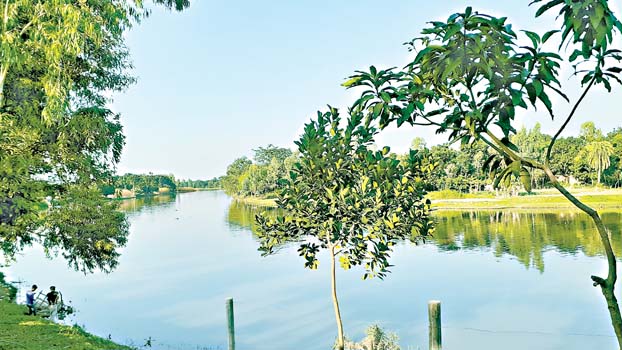No fish can survive in Baranoi
The river dying for toxic wastes dumped from Rajshahi city


Baranoi river, a tributary emerged from the Beel Kumari at Tanore, was once a turbulent river connecting the famous Chalanbeel is now nearly dying due to indiscriminate dumping of wastes in the river.
The water of the river Baranoi has turned poisonous and brackish due to disposal of the toxic wastes from the hospitals, educational institutions, clinics, business establishments, BSCIC Industrial estate, human wastes, drainage wastes and house-hold wastes of people living in Rajshahi city.
Several million people living beside the river Baranoi are also being attacked with various contagious diseases, including dermatitis, diarrhea and dysentery, due to the toxic impacts of those solid and liquid chemical wastes for a long time. This toxic waste is also destroying surrounding environment, fish, birds, aquatic and domestic animals. The animals and birds are being attacked with various diseases by consuming the contagious water and even the crops like Paddy, Wheat, Sugarcane and Maize and vegetables like Potato, Cabbage, Cauliflower, Brinjal, Radish, Spinach area being poisonous as a result of using of the toxic water of the river. For last 20-year or more, no fish can survive in the water of the river Baranoi for the poisonous water.
A sanctuary for fish created at Sadhanpur, some 50-kilometer far from the source of the river in Rajshahi, also died due to toxic impact of water. Often dead fish are seen to float on water. Even, sometimes large fish caught from the river, emits bad smell after cooking. The entire bio-diversity surrounding the river has been destroyed which is also threatening lives of human beings living beside the river.
The river Baranoi flows through Tanore upazila and Bagdhani of Paba upazila. The Fakinni river also joined with Baranoi river at Bagmara and met with Atrai river near Gadhoya of Kalam Union under Singra upazila after flowing some 100-kilometre through Paba, Mohanpur, Bagmara, Durgapur, Puthia of Rajshahi and Naldanga and Singra of Natore district. The river is connected with more than 50 canals. Livelihood of millions of people depends on the river who use water of this river for the purpose of irrigation, communication and catching of fishes.
All sort of wastes collected and drained out from the city are dumped in this river through Durari canal near the City Hat and through the drains behind Rajshahi Development Authority. Nearly 100 kilometre areas of water of the river has turned highly toxic and poisonous due to dumping of these wastes direct into the river.
Thousands of people of Paba, Mohanpur, Bagmara, Dugapur, Puthia, Naldanga and Singra has appealed to the government to save them, their livestock and fish from toxic effect of the river Baranoi. The questioned." We are human beings, so why should we be attacked and affected by poisons of wastes disposed from the people of Rajshahi City?" The demanded to stop immediately the disposal of all sort of city waste in the river Baranoi and to save human beings living beside the river, livestock, birds and fish. They requested the RCC and the RDA, the Ministry of Environment, Members of Parliaments of Rajshahi region and the journalists to adopt alternative step immediately to save the river from being polluted and to set up wastewater treatment plant. Sajjad Hossain Mukul, Chairman of Shilmari Union Parishad under Puthia upazila informed, the entire 100 kilometre areas of the river are being polluted from the disposal of solid and liquid wastes from the people of Rajshahi City Corporation. He demanded immediate stoppage of the disposal of the wastes in Baranoi river. AHM Khairuzzaman Liton, Mayor of Rajshahi City Corporation informed, the RCC is going to take steps to recycle the solid wastes and to treat the liquid wastes before disposing those to river or any other water body. He said, already discussion has been held with some foreign consultants and international environmental organisations to take pragmatic steps to turn the city wastes reusable and recyclable. The works of recycling of solid waste and polluted water soon be started, he mentioned.


